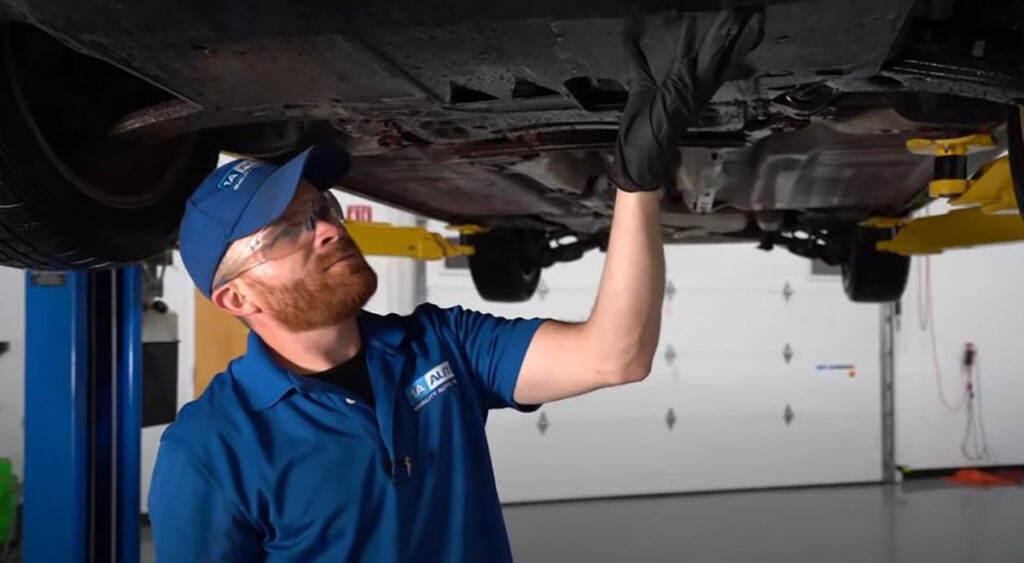How Much Is It To Fix An Overheated Car?

Is your car’s temperature gauge soaring into the red? Discovering the cost to fix an overheated car can vary, but CARDIAGTECH.NET offers solutions to help you understand and potentially mitigate these expenses. We can help equip you with the right tools and knowledge to address car overheating issues efficiently. Find the best diagnostic tools and equipment at CARDIAGTECH.NET to keep your engine running cool and your repair costs manageable.
1. Understanding Why Your Car Overheated: Identifying the Root Cause
An overheating engine is a serious issue that can lead to significant damage if not addressed promptly. Pinpointing the exact reason why your car overheated is the first step in determining the repair costs. Various factors can cause this problem, each with different price tags for the fix. By diagnosing the cause accurately, you can avoid unnecessary repairs and get your vehicle back on the road safely.
Here, we’ll explore common causes and what you can expect to pay to resolve them:
- Coolant Leaks
- Low Oil Levels
- Thermostat Issues
- Water Pump Failure
- Radiator Problems
2. Coolant Leak: Addressing Leaks in Your Engine’s Cooling System
Coolant circulates through hoses connected to the radiator, engine block, and cylinder heads. Cracks in these components or worn gaskets can cause coolant to leak, leading to overheating. According to the National Institute for Automotive Service Excellence (ASE), maintaining the proper coolant level is critical for engine health.
2.1. Radiator Cap Replacement: A Simple and Affordable Fix
A faulty radiator cap can cause coolant leaks and pressure loss. Replacing it is usually inexpensive.
- Cost: $60-$80
2.2. Radiator Leak: More Extensive Damage
A leaking radiator requires professional repair or replacement to prevent further damage.
- Cost: $300-$900
2.3. Blown Head Gasket: A Major Engine Repair
A blown head gasket allows coolant to leak into the engine, causing severe overheating and potential engine failure. This is often a result of neglecting other cooling system issues, according to RepairPal.
- Cost: $1,200-$2,000+
 Coolant Leak
Coolant Leak
3. Low Oil: Maintaining Proper Lubrication to Prevent Overheating
Low oil levels can cause friction between engine parts, leading to overheating. Regularly checking and maintaining the correct oil level is crucial. The American Automobile Association (AAA) recommends checking your oil at least once a month.
3.1. Oil Change: A Basic Maintenance Task
A simple oil change can prevent overheating caused by low oil levels.
- Cost: $35-$75
3.2. Oil Leak Repair: Addressing the Underlying Issue
If you have an oil leak, repairing it promptly can prevent further engine damage. Addressing oil leaks ensures that your engine remains properly lubricated.
- Cost: $150-$1,000+
4. Bad Thermostat: Ensuring Accurate Temperature Regulation
The thermostat regulates coolant flow based on engine temperature. A faulty thermostat can prevent the engine from regulating its temperature properly, leading to overheating. According to a study by the Society of Automotive Engineers (SAE), a malfunctioning thermostat can reduce fuel efficiency by as much as 15%.
4.1. Thermostat Replacement: A Straightforward Repair
Replacing a faulty thermostat ensures your engine can regulate its temperature effectively.
- Cost: $200-$500
5. Faulty Water Pump: Keeping Coolant Flowing Effectively
The water pump circulates coolant through the engine. A failing water pump can disrupt this flow, causing the engine to overheat. The Car Care Council emphasizes the importance of a properly functioning water pump for engine cooling.
5.1. Water Pump Replacement: Essential for Engine Cooling
Replacing a faulty water pump restores proper coolant circulation, preventing overheating.
- Cost: $400-$800
5.2. Serpentine Belt Replacement: Ensuring Water Pump Functionality
The serpentine belt drives the water pump. A worn or broken belt can cause the water pump to fail, leading to overheating. Regular inspection and replacement of the serpentine belt are essential.
- Cost: Less than $150
6. Failing Radiator: Dissipating Heat Efficiently
The radiator dissipates heat from the coolant. A failing radiator, due to fan issues or blockages, can cause the engine to overheat. Regular maintenance and cleaning of the radiator can prevent these issues.
6.1. Radiator Repair or Replacement: Maintaining Optimal Cooling
Repairing or replacing a failing radiator ensures efficient heat dissipation and prevents engine overheating.
- Cost: Up to $900
 Failing Radiator
Failing Radiator
7. Immediate Actions: What to Do When Your Car Overheats
When your car’s temperature gauge spikes, taking immediate action is crucial to prevent severe engine damage. Here’s a step-by-step guide:
7.1. Turn on the Heater: Redirecting Heat from the Engine
Turning on the heater can draw heat away from the engine and into the cabin, providing temporary relief.
7.2. Find a Safe Place to Stop: Prioritizing Safety
Pull over safely as soon as possible and turn off the car to minimize engine damage.
7.3. Let the Engine Cool: Allowing Adequate Cooling Time
Wait at least 15 minutes for the engine to cool down. Ensure the temperature gauge returns to normal before restarting the car. Avoid opening the hood while the engine is hot to prevent burns from steam or smoke.
7.4. Continue Driving with Caution: Monitoring Temperature Levels
If the temperature remains low after cooling, you can continue driving. However, be prepared to stop and let the car cool off again if it starts to overheat.
7.5. Professional Inspection: Seeking Expert Advice
Have your car checked by a professional mechanic immediately. Ignoring an overheating engine can lead to extensive and costly damage.
8. Symptoms of Engine Damage from Overheating: Recognizing the Signs
Recognizing the signs of engine damage from overheating can help you take timely action and prevent further issues. These symptoms include:
- Steam coming from under the hood
- Sweet coolant smell
- Low coolant levels
- Engine knocking
- White smoke from the exhaust
9. Detailed Cost Breakdown: How Much is it to Fix an Overheated Car?
To give you a clearer picture, here’s a detailed breakdown of potential costs associated with fixing an overheated car:
| Repair | Description | Estimated Cost |
|---|---|---|
| Radiator Cap Replacement | Replacing a faulty radiator cap. | $60-$80 |
| Radiator Leak Repair | Repairing a leaking radiator. | $300-$900 |
| Blown Head Gasket Repair | Repairing a blown head gasket. | $1,200-$2,000+ |
| Oil Change | Performing a standard oil change. | $35-$75 |
| Oil Leak Repair | Repairing an oil leak. | $150-$1,000+ |
| Thermostat Replacement | Replacing a faulty thermostat. | $200-$500 |
| Water Pump Replacement | Replacing a faulty water pump. | $400-$800 |
| Serpentine Belt Replacement | Replacing the serpentine belt. | Less than $150 |
| Radiator Repair or Replacement | Repairing or replacing a damaged radiator. | Up to $900 |
These costs can vary based on the make and model of your vehicle, the complexity of the repair, and the labor rates in your area.
10. Preventative Maintenance: Avoiding Overheating Issues
Preventative maintenance is key to avoiding overheating issues. Regular checks and timely servicing can save you from costly repairs down the road.
10.1. Regular Coolant Checks: Maintaining Proper Levels
Check your coolant levels regularly and top off as needed. Use the correct type of coolant for your vehicle to prevent corrosion and maintain optimal cooling efficiency.
10.2. Oil Changes: Keeping the Engine Lubricated
Follow the manufacturer’s recommended oil change intervals. Regular oil changes keep the engine properly lubricated, reducing friction and preventing overheating.
10.3. Radiator Maintenance: Cleaning and Inspection
Keep the radiator clean and free of debris. Inspect the radiator hoses for cracks or leaks and replace them as needed.
10.4. Thermostat Inspection: Ensuring Proper Function
Have the thermostat inspected periodically to ensure it’s functioning correctly. Replace it if it’s showing signs of failure.
10.5. Water Pump Inspection: Checking for Leaks and Wear
Inspect the water pump for leaks and signs of wear. Replace it if necessary to maintain proper coolant circulation.
11. The Role of Diagnostic Tools: Using CARDIAGTECH.NET for Accurate Diagnosis
Accurate diagnosis is crucial for addressing overheating issues effectively. CARDIAGTECH.NET offers a range of diagnostic tools that can help you pinpoint the exact cause of the problem.
11.1. Importance of Accurate Diagnosis
An accurate diagnosis ensures that you address the root cause of the overheating issue, preventing further damage and unnecessary repairs.
11.2. CARDIAGTECH.NET Diagnostic Tools
CARDIAGTECH.NET provides a variety of diagnostic tools suitable for both professional mechanics and DIY enthusiasts. These tools can help you identify issues such as coolant leaks, thermostat failures, and water pump problems.
11.3. Benefits of Using Professional-Grade Tools
Using professional-grade diagnostic tools ensures accurate results, saving you time and money on unnecessary repairs. These tools often come with advanced features and comprehensive diagnostic capabilities.
12. Cost-Effective Solutions: DIY vs. Professional Repair
Deciding whether to tackle the repair yourself or hire a professional mechanic depends on your skill level and the complexity of the issue.
12.1. DIY Repairs: When to Handle It Yourself
Simple repairs, such as replacing a radiator cap or changing the oil, can often be handled yourself. CARDIAGTECH.NET offers a range of tools and equipment to help you with these tasks.
12.2. Professional Repairs: When to Seek Expert Help
More complex repairs, such as replacing a head gasket or diagnosing intricate cooling system issues, should be left to professional mechanics. They have the expertise and equipment to handle these repairs safely and effectively.
12.3. Balancing Cost and Expertise
Consider the cost of parts and tools versus the labor costs of a professional mechanic. Also, factor in your own skill level and the potential risks of DIY repairs.
13. Choosing the Right Mechanic: Selecting a Trusted Professional
Choosing the right mechanic is essential for ensuring quality repairs and fair pricing. Here are some tips for selecting a trusted professional:
13.1. Check Reviews and Ratings
Look for online reviews and ratings of local mechanics. Sites like Yelp and Google Reviews can provide valuable insights into the quality of service and customer satisfaction.
13.2. Ask for Recommendations
Ask friends, family, and colleagues for recommendations. Personal referrals can be a great way to find a reliable mechanic.
13.3. Verify Certifications
Ensure the mechanic is certified by organizations like ASE. Certifications demonstrate that the mechanic has the necessary training and expertise.
13.4. Get a Written Estimate
Always get a written estimate before authorizing any repairs. The estimate should include a detailed breakdown of the costs for parts and labor.
13.5. Ask Questions
Don’t hesitate to ask questions about the repair process and the parts being used. A reputable mechanic will be happy to explain everything in detail.
14. Understanding Labor Costs: Factors Influencing Repair Expenses
Labor costs can significantly impact the overall cost of fixing an overheated car. Several factors influence these costs:
14.1. Location
Labor rates vary depending on your location. Mechanics in urban areas typically charge higher rates than those in rural areas.
14.2. Shop Size and Reputation
Larger, more reputable shops often charge higher labor rates due to their overhead costs and the expertise of their mechanics.
14.3. Complexity of the Repair
The complexity of the repair also affects labor costs. More time-consuming and intricate repairs will naturally incur higher labor charges.
14.4. Mechanic’s Experience
Experienced mechanics may charge higher rates due to their specialized knowledge and skills.
15. Parts and Components: Quality and Cost Considerations
The quality and cost of parts and components can also impact the overall repair expenses.
15.1. OEM vs. Aftermarket Parts
Original Equipment Manufacturer (OEM) parts are made by the original manufacturer and are typically more expensive than aftermarket parts. Aftermarket parts are made by third-party manufacturers and can vary in quality.
15.2. Choosing Quality Parts
While aftermarket parts can be more affordable, it’s essential to choose quality parts from reputable manufacturers. Low-quality parts may fail prematurely, leading to additional repairs.
15.3. Warranty Considerations
Check the warranty on the parts being used. A longer warranty can provide peace of mind and protect you from potential defects.
16. Long-Term Effects of Overheating: Preventing Severe Damage
Ignoring an overheating engine can lead to severe and costly damage. Understanding the long-term effects can motivate you to address the issue promptly.
16.1. Head Gasket Failure
Overheating can cause the head gasket to fail, allowing coolant to leak into the engine. This can lead to further damage and expensive repairs.
16.2. Engine Block Damage
Severe overheating can crack the engine block, rendering the engine irreparable. Replacing the engine is a major expense.
16.3. Piston and Cylinder Damage
Overheating can cause pistons and cylinders to warp or seize, leading to engine failure.
16.4. Reduced Engine Lifespan
Even if overheating doesn’t cause immediate damage, it can reduce the overall lifespan of the engine.
17. Using CARDIAGTECH.NET to Find the Right Parts: Sourcing Quality Components
CARDIAGTECH.NET can help you find the right parts and components for your vehicle, ensuring quality and compatibility.
17.1. Wide Selection of Parts
CARDIAGTECH.NET offers a wide selection of parts for various makes and models.
17.2. Quality Assurance
CARDIAGTECH.NET partners with reputable manufacturers to ensure the quality and reliability of its parts.
17.3. Expert Support
CARDIAGTECH.NET provides expert support to help you choose the right parts for your vehicle.
18. Financing Options: Managing Repair Costs
If you’re facing significant repair costs, exploring financing options can help you manage the expense.
18.1. Credit Cards
Using a credit card can provide immediate access to funds for repairs. Look for cards with low interest rates or promotional offers.
18.2. Personal Loans
Personal loans offer fixed interest rates and repayment terms, making them a predictable financing option.
18.3. Auto Repair Loans
Some lenders specialize in auto repair loans, offering financing specifically for vehicle repairs.
18.4. Shop Financing
Some repair shops offer financing options, allowing you to pay for repairs over time.
19. Case Studies: Real-World Examples of Overheating Repairs
Examining real-world case studies can provide valuable insights into the costs and complexities of overheating repairs.
19.1. Case Study 1: Radiator Leak Repair
A vehicle with a radiator leak required a new radiator and hoses. The total cost, including parts and labor, was $750.
19.2. Case Study 2: Blown Head Gasket Repair
A vehicle with a blown head gasket required extensive engine work. The total cost, including parts and labor, exceeded $2,000.
19.3. Case Study 3: Thermostat Replacement
A vehicle with a faulty thermostat required a thermostat replacement. The total cost, including parts and labor, was $350.
20. Future of Automotive Diagnostics: How CARDIAGTECH.NET is Leading the Way
The future of automotive diagnostics is evolving rapidly, with advanced technologies and tools transforming the way vehicles are diagnosed and repaired. CARDIAGTECH.NET is at the forefront of this evolution, providing innovative solutions for automotive professionals and enthusiasts.
20.1. Telematics and Remote Diagnostics
Telematics and remote diagnostics enable mechanics to diagnose vehicle issues remotely, saving time and improving efficiency.
20.2. Artificial Intelligence (AI) in Diagnostics
AI-powered diagnostic tools can analyze vast amounts of data to identify patterns and predict potential issues.
20.3. Virtual Reality (VR) Training
VR training provides mechanics with immersive learning experiences, improving their skills and knowledge.
20.4. CARDIAGTECH.NET’s Role in Innovation
CARDIAGTECH.NET is committed to providing cutting-edge diagnostic tools and solutions, helping automotive professionals stay ahead of the curve.
21. Benefits of Regular Maintenance: Investing in Your Car’s Longevity
Investing in regular maintenance is one of the best ways to ensure your car’s longevity and prevent costly repairs. Regular maintenance includes:
- Oil changes
- Coolant flushes
- Brake inspections
- Tire rotations
- Battery checks
22. Connecting with CARDIAGTECH.NET: Your Partner in Automotive Solutions
CARDIAGTECH.NET is your trusted partner in automotive solutions, offering a wide range of tools, equipment, and support to help you keep your vehicle running smoothly.
22.1. Wide Range of Products
CARDIAGTECH.NET offers a wide range of products, including diagnostic tools, repair equipment, and replacement parts.
22.2. Expert Support and Guidance
CARDIAGTECH.NET provides expert support and guidance to help you choose the right products and solutions for your needs.
22.3. Commitment to Quality and Innovation
CARDIAGTECH.NET is committed to providing high-quality products and innovative solutions, helping you stay ahead of the curve in the automotive industry.
23. Overheating Warning Signs: How to Tell If Your Car Is Overheating
Recognizing the warning signs of overheating can help you take timely action and prevent severe engine damage. These signs include:
- Temperature gauge reading high
- Steam coming from under the hood
- Sweet coolant smell
- Engine knocking
- Reduced engine power
24. Environmental Impact: Responsible Car Maintenance
Responsible car maintenance is essential for protecting the environment and reducing your carbon footprint.
24.1. Proper Disposal of Fluids
Dispose of used oil, coolant, and other fluids properly to prevent contamination of soil and water.
24.2. Recycling Parts
Recycle used parts whenever possible to conserve resources and reduce waste.
24.3. Fuel Efficiency
Maintain your vehicle properly to ensure optimal fuel efficiency, reducing emissions and saving money on gas.
25. Importance of a Coolant Flush: Removing Contaminants
A coolant flush is an important maintenance task that helps remove contaminants and maintain the cooling system’s efficiency.
25.1. Removing Sediment and Debris
A coolant flush removes sediment, rust, and other debris that can accumulate in the cooling system.
25.2. Preventing Corrosion
A coolant flush helps prevent corrosion by removing acidic contaminants and replenishing the coolant’s protective additives.
25.3. Maintaining Optimal Cooling Efficiency
A coolant flush ensures that the cooling system operates at peak efficiency, preventing overheating and prolonging the engine’s lifespan.
26. The Impact of Climate: Hot Weather and Overheating
Hot weather can exacerbate overheating issues, making it even more important to maintain your vehicle’s cooling system.
26.1. Increased Engine Load
Hot weather increases the engine load, making it more susceptible to overheating.
26.2. Air Conditioning Strain
The air conditioning system puts additional strain on the engine, further increasing the risk of overheating.
26.3. Importance of Coolant Strength
In hot weather, it’s especially important to ensure that your coolant is at the proper strength and concentration to provide adequate cooling.
27. Seasonal Maintenance: Preparing Your Car for Summer and Winter
Seasonal maintenance is essential for preparing your car for the challenges of summer and winter.
27.1. Summer Maintenance
Summer maintenance includes checking the cooling system, air conditioning system, and tire pressure.
27.2. Winter Maintenance
Winter maintenance includes checking the battery, antifreeze levels, and tire tread.
28. Legal Considerations: Maintaining a Safe Vehicle
Maintaining a safe vehicle is not only important for your own well-being but also for compliance with legal regulations.
28.1. Vehicle Inspections
Many states require regular vehicle inspections to ensure that vehicles meet safety standards.
28.2. Liability for Accidents
If your vehicle is involved in an accident due to negligence or lack of maintenance, you could be held liable for damages.
29. Innovations in Cooling Systems: Advances in Technology
Innovations in cooling systems are constantly improving the efficiency and reliability of vehicle cooling.
29.1. Electric Water Pumps
Electric water pumps offer improved efficiency and control compared to traditional mechanical pumps.
29.2. Active Grille Shutters
Active grille shutters improve aerodynamics and fuel efficiency by controlling airflow through the radiator.
29.3. Advanced Coolant Formulations
Advanced coolant formulations offer improved corrosion protection and heat transfer capabilities.
30. Real-Time Monitoring: Staying Informed While Driving
Real-time monitoring systems can provide valuable information about your vehicle’s performance, helping you identify potential issues before they become major problems.
30.1. Temperature Gauges
Temperature gauges provide real-time information about the engine’s temperature, allowing you to take action if it starts to overheat.
30.2. Diagnostic Scanners
Diagnostic scanners can read data from the vehicle’s computer, providing insights into various systems and components.
30.3. Mobile Apps
Mobile apps can connect to the vehicle’s computer and provide real-time data and diagnostic information.
31. CARDIAGTECH.NET Community: Connecting with Other Car Enthusiasts
The CARDIAGTECH.NET community is a valuable resource for connecting with other car enthusiasts, sharing tips and advice, and learning about the latest automotive trends.
31.1. Forums and Discussion Boards
Forums and discussion boards provide a platform for sharing information and asking questions.
31.2. Social Media Groups
Social media groups offer a convenient way to connect with other car enthusiasts and stay up-to-date on the latest news and events.
31.3. Local Events and Meetups
Local events and meetups provide opportunities to meet other car enthusiasts in person and share your passion for automobiles.
32. Frequently Asked Questions (FAQs): Addressing Common Concerns
Here are some frequently asked questions about overheating repairs:
- What are the most common causes of car overheating?
- Common causes include coolant leaks, low oil levels, thermostat issues, water pump failures, and radiator problems.
- How much does it cost to replace a radiator?
- Radiator replacement can cost up to $900, depending on the vehicle and repair shop.
- Can I drive my car if it’s overheating?
- It’s best to avoid driving an overheating car to prevent severe engine damage.
- What should I do if my car starts to overheat while driving?
- Turn on the heater, find a safe place to stop, let the engine cool, and have it checked by a professional.
- How often should I check my coolant levels?
- Check your coolant levels regularly, ideally at least once a month.
- What is a blown head gasket, and how much does it cost to repair?
- A blown head gasket is when the seal between the engine block and cylinder head fails, leading to coolant leaks and engine damage. Repair costs can exceed $2,000.
- Is it safe to open the hood when the engine is overheating?
- No, it’s not safe to open the hood immediately due to the risk of burns from steam or hot coolant.
- Can low oil cause my car to overheat?
- Yes, low oil levels can lead to increased friction and overheating.
- How can I prevent my car from overheating?
- Regular maintenance, including coolant checks, oil changes, and radiator cleaning, can prevent overheating.
- What tools from CARDIAGTECH.NET can help diagnose overheating issues?
- CARDIAGTECH.NET offers diagnostic tools that can help pinpoint the exact cause of overheating, such as coolant leaks or thermostat failures.
Don’t let an overheated engine leave you stranded and with a hefty repair bill. CARDIAGTECH.NET is here to help. Contact us today at 276 Reock St, City of Orange, NJ 07050, United States or Whatsapp: +1 (641) 206-8880, or visit our website CARDIAGTECH.NET to explore our range of diagnostic tools and equipment. Our expert team is ready to assist you with any questions and ensure you have the tools you need to tackle any automotive repair. Get in touch now and let us help you keep your car running cool and efficiently.




